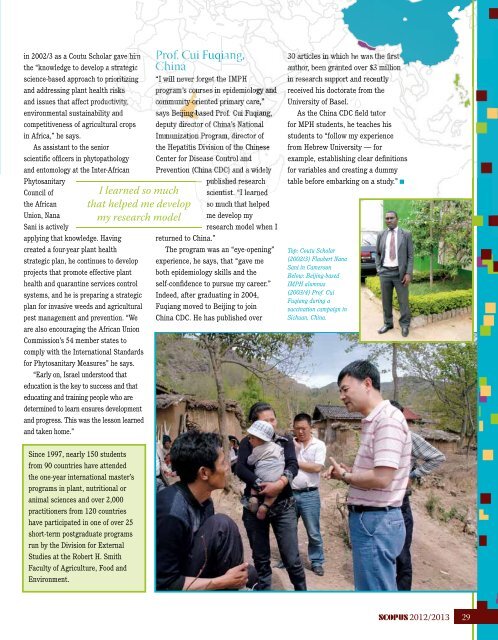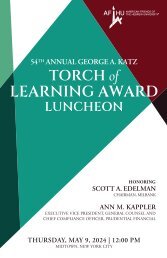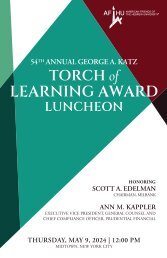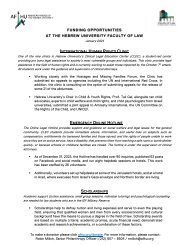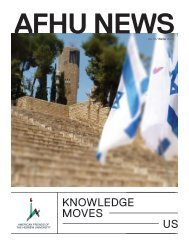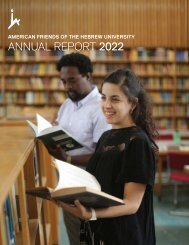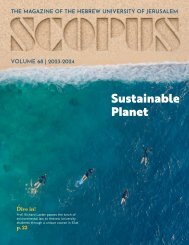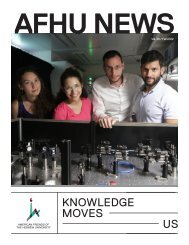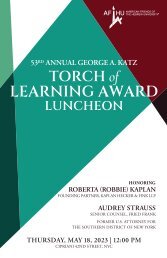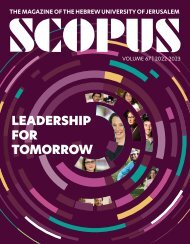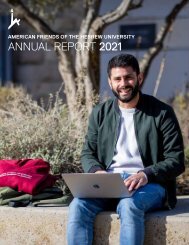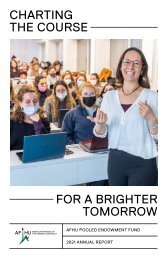Create successful ePaper yourself
Turn your PDF publications into a flip-book with our unique Google optimized e-Paper software.
in 2002/3 as a Coutu Scholar gave him<br />
the “knowledge to develop a strategic<br />
science-based approach to prioritizing<br />
and addressing plant health risks<br />
and issues that affect productivity,<br />
environmental sustainability and<br />
competitiveness of agricultural crops<br />
in Africa,” he says.<br />
As assistant to the senior<br />
scientific officers in phytopathology<br />
and entomology at the Inter-African<br />
Phytosanitary<br />
Council of<br />
the African<br />
Union, Nana<br />
Sani is actively<br />
applying that knowledge. Having<br />
created a four-year plant health<br />
strategic plan, he continues to develop<br />
projects that promote effective plant<br />
health and quarantine services control<br />
systems, and he is preparing a strategic<br />
plan for invasive weeds and agricultural<br />
pest management and prevention. “We<br />
are also encouraging the African Union<br />
Commission’s 54 member states to<br />
comply with the International Standards<br />
for Phytosanitary Measures” he says.<br />
“Early on, Israel understood that<br />
education is the key to success and that<br />
educating and training people who are<br />
determined to learn ensures development<br />
and progress. This was the lesson learned<br />
and taken home.”<br />
I learned so much<br />
that helped me develop<br />
my research model<br />
Prof. Cui Fuqiang,<br />
China<br />
“I will never forget the IMPH<br />
program’s courses in epidemiology and<br />
community-oriented primary care,”<br />
says Beijing-based Prof. Cui Fuqiang,<br />
deputy director of China’s National<br />
Immunization Program, director of<br />
the Hepatitis Division of the Chinese<br />
Center for Disease Control and<br />
Prevention (China CDC) and a widely<br />
published research<br />
scientist. “I learned<br />
so much that helped<br />
me develop my<br />
research model when I<br />
returned to China.”<br />
The program was an “eye-opening”<br />
experience, he says, that “gave me<br />
both epidemiology skills and the<br />
self-confidence to pursue my career.”<br />
Indeed, after graduating in 2004,<br />
Fuqiang moved to Beijing to join<br />
China CDC. He has published over<br />
30 articles in which he was the first<br />
author, been granted over $3 million<br />
in research support and recently<br />
received his doctorate from the<br />
University of Basel.<br />
As the China CDC field tutor<br />
for MPH students, he teaches his<br />
students to “follow my experience<br />
from Hebrew University — for<br />
example, establishing clear definitions<br />
for variables and creating a dummy<br />
table before embarking on a study.”<br />
Top: Coutu Scholar<br />
(2002/3) Flaubert Nana<br />
Sani in Cameroon<br />
Below: Beijing-based<br />
IMPH alumnus<br />
(2003/4) Prof. Cui<br />
Fuqiang during a<br />
vaccination campaign in<br />
Sichuan, China.<br />
Since 1997, nearly 150 students<br />
from 90 countries have attended<br />
the one-year international master’s<br />
programs in plant, nutritional or<br />
animal sciences and over 2,000<br />
practitioners from 120 countries<br />
have participated in one of over 25<br />
short-term postgraduate programs<br />
run by the Division for External<br />
Studies at the Robert H. Smith<br />
Faculty of Agriculture, Food and<br />
Environment.<br />
<strong>2012</strong>/<strong>2013</strong><br />
29


